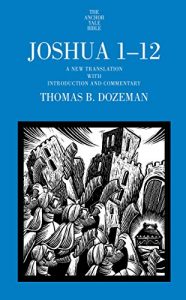DOZEMAN, T. B. Joshua 1-12: A New Translation with Introduction and Commentary. New Haven, CT: Yale University Press, 2015, 600 p. – ISBN 9780300149753
Diz Thomas B. Dozeman, nas páginas 5-6:
A identificação do autor ou autores de Josué desempenhou um papel central na interpretação do livro desde o século XIX. Os intérpretes há muito observam conflitos em temas e motivos, o que sugere uma história de composição de diferentes autores. O tema central da conquista, por exemplo, permanece sem solução no livro, com alguns textos indicando o extermínio de reis, cidades reais e povos e outros afirmando que as nações indígenas permanecem na terra. As duas leituras são ainda associadas a funções distintas da Torá, como representando o sucesso na guerra ou como enfatizando a necessidade de obediência como condição para o sucesso. A arca também é descrita com uma série de palavras e frases, incluindo a “arca”, a “arca da aliança”, a “arca de Iahweh” e a “arca do testemunho” (Js 3-5). Episódios centrais se repetem, como o estabelecimento das pedras memoriais e os discursos finais de Josué. Todos esses problemas literários apontam para uma história da composição na formação do livro.
temas e motivos, o que sugere uma história de composição de diferentes autores. O tema central da conquista, por exemplo, permanece sem solução no livro, com alguns textos indicando o extermínio de reis, cidades reais e povos e outros afirmando que as nações indígenas permanecem na terra. As duas leituras são ainda associadas a funções distintas da Torá, como representando o sucesso na guerra ou como enfatizando a necessidade de obediência como condição para o sucesso. A arca também é descrita com uma série de palavras e frases, incluindo a “arca”, a “arca da aliança”, a “arca de Iahweh” e a “arca do testemunho” (Js 3-5). Episódios centrais se repetem, como o estabelecimento das pedras memoriais e os discursos finais de Josué. Todos esses problemas literários apontam para uma história da composição na formação do livro.
Os problemas de composição são agravados pelo contexto literário de Josué como o livro de transição entre o Pentateuco e os Profetas anteriores. Os intérpretes têm defendido duas teorias de composição, dependendo se Josué é lido mais ligado ao primeiro ou ao segundo grupo de livros. Aqueles que interpretam Josué com o Pentateuco consideram seu contexto literário o Hexateuco, que consiste de Gênesis a Josué. Aqueles que se concentram, em vez disso, no cenário dos Profetas anteriores interpretam Josué dentro da Obra Histórica Deuteronomista, que inclui os livros do Deuteronômio até Reis. As duas abordagens geram interpretações diferentes do livro. Como conclusão do Hexateuco, Josué funciona em continuidade com a literatura do Pentateuco, fornecendo o cumprimento da promessa divina da terra. Mas, como introdução à Obra Histórica Deuteronomista, Josué fornece um ponto de contraste com o declínio e queda da nação israelita narrada em Juízes, Samuel e Reis.
A história da pesquisa sobre a composição e o contexto literário de Josué pode ser dividida em quatro etapas, cada uma introduzindo metodologias distintas que continuam até os dias de hoje:
1. Século XIX: identificação de fontes literárias do Pentateuco em Josué, lendo-o como a conclusão do Pentateuco, formando, assim, um Hexateuco
2. Início do século XX: interpretação de Josué como história, nas pesquisas da arqueologia, da geografia histórica e da história tradicional
3. Final do século XX: análise de modelos históricos para interpretar o livro de Josué e predominância da hipótese de uma Obra Histórica Deuteronomista
4. Século XXI: crítica da hipótese de uma Obra Histórica Deuteronomista e a proposta de novos modelos literários para interpretar Josué.
O resumo da pesquisa estabelecerá a base para minha interpretação de Josué como um livro independente escrito durante o período pós-exílico de um ponto de vista de Israel norte. Também argumento que o livro de Josué adquire seu contexto literário atual em um estágio posterior ao da formação do Pentateuco e dos Profetas anteriores.
The identification of the author or authors of Joshua has played a central role in the interpretation of the book since the nineteenth century. Interpreters have long noted conflicts in themes and motifs, which suggest a history of composition by different authors. The central theme of the conquest, for example, remains unresolved in the book, with some texts indicating the extermination of the kings, royal cities, and people and others stating that the indigenous nations remain in the land. The two readings are further coupled with distinct functions of the Torah, as representing success in war or as underscoring the need for obedience as a condition for success. The ark, too, is described with a range of words and phrases, including the “ark,” the “ark of the covenant,” the “ark of Yahweh,” and the “ark of the testimony.” Central episodes are repeated, such as the establishment of the memorial stones and the concluding speeches of Joshua. All of these literary problems point to a history of composition in the formation of the book.
 The problems of composition are compounded by the literary context of Joshua as the transitional book between the Pentateuch and the Former Prophets. Interpreters have advocated two theories of composition, depending on whether Joshua is read more closely with the former or with the latter. Those who interpret Joshua with the Pentateuch take its literary context to be the Hexateuch, consisting of Genesis through Joshua. Th ose who focus instead on the setting of the Former Prophets interpret Joshua within the Deuteronomistic History, which includes the books of Deuteronomy through Kings. The two approaches yield different interpretations of the book. As the conclusion to the Hexateuch, Joshua functions in continuity with the literature of the Pentateuch by providing the fulfi llment of the divine promise of land. But as the introduction to the Deuteronomistic History, Joshua provides the point of contrast to the decline and fall of the Israelite nation chronicled in Judges, Samuel, and Kings.
The problems of composition are compounded by the literary context of Joshua as the transitional book between the Pentateuch and the Former Prophets. Interpreters have advocated two theories of composition, depending on whether Joshua is read more closely with the former or with the latter. Those who interpret Joshua with the Pentateuch take its literary context to be the Hexateuch, consisting of Genesis through Joshua. Th ose who focus instead on the setting of the Former Prophets interpret Joshua within the Deuteronomistic History, which includes the books of Deuteronomy through Kings. The two approaches yield different interpretations of the book. As the conclusion to the Hexateuch, Joshua functions in continuity with the literature of the Pentateuch by providing the fulfi llment of the divine promise of land. But as the introduction to the Deuteronomistic History, Joshua provides the point of contrast to the decline and fall of the Israelite nation chronicled in Judges, Samuel, and Kings.
The history of research on the composition and the literary context of Joshua can be divided into four stages, with each introducing distinct methodologies that continue into the present time. (1) Nineteenth century: Identification of literary sources in Joshua as the completion of the Pentateuch/Hexateuch. (2) Early twentieth century: Interpretation of Joshua as history through the methodologies of archaeology, historical geography, and tradition history. (3) Late twentieth century: Breakdown of historical models for interpreting the book of Joshua and the prominence of the Deuteronomistic History hypothesis. (4) Twenty-first century: Erosion of the Deuteronomistic History hypothesis and new literary models for interpreting Joshua.
The summary of research will lay the foundation for my interpretation of Joshua as an independent book written during the postexilic period from a northern point of view. I also argue that the book of Joshua acquires its present literary context at a late stage in the formation of the Pentateuch and the Former Prophets*.
* As citações bíblicas presentes no texto foram omitidas aqui.
